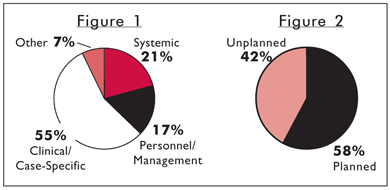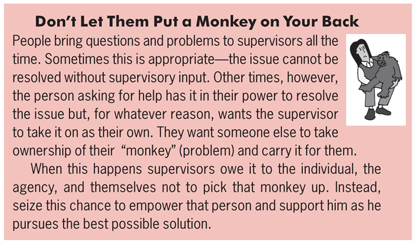 |
 |
 |
©
2008 Jordan Institute
for Families

Vol.
13, No. 2
March 2008
Time Management Tips for Supervisors
Recently Practice Notes asked a child welfare supervisor what she would change about herself to make her a more effective supervisor. Without a beat she answered: “Time. I just need more time to get everything done!” Then she laughed.
We laughed, too, but the issue isn’t funny. Supervisors and staff in child welfare agencies consistently say managing time is a serious challenge for them.
A Small Study
The importance of time management for supervisors was underscored by a small study done recently with members of North Carolina’s Child Welfare Supervision Work Group. In this study supervisors from a mix of different counties agreed to keep a log of how they used their work time during a typical week in fall 2007. The log broke activities up into four categories:
- Systemic (not case specific). Examples: regular unit meetings, compiling information for reports, etc.
- Personnel/Management (not case specific). Examples: Attend training events, coach individual staff, etc.
- Case-Specific/Clinical. Examples: Review case documentation, fill in for absent workers, attend court, etc.
- Other. Anything not in the first three categories.
Although the sample size is too small to make this count as a scientific study—only ten supervisors participated—the results are interesting. Figure 1 presents the mean (or average) amount of time participating supervisors spent on the various categories. Figure 2 presents the average amount of time devoted to planned and unplanned activities.

What’s your reaction to this? What would a similar study say about how you use time? How could you improve your use of time?
Assessing your “Open Door” Policy
Cutting back on “open door” time is a strategy that has helped some supervisors get a better handle on their time. While it is important for workers to know they have access to their supervisor when urgently needed, an unqualified “open door” policy can mean that the majority of supervisor-worker contact focuses on emergencies. This leaves little time for more strategic, reflective supervision. It also means some families and children simply do not receive supervisory attention. When this happens, risk factors can be missed and families can lose out on ideas, resources, and insights that a supervisor might offer.
Instituting a policy of scheduled supervision time can help workers better prioritize issues and plan their own days. True emergencies will always come up that need immediate attention. But when workers know their planned time with their supervisor will be protected as much as possible, they begin to develop lists of questions. Both worker and supervisor can then begin to see the patterns and themes that emerge for individual families and for the worker, pointing the way to the training, reflection, or discussion that the worker needs to grow and advance.

Other Tips
Some general tips for better time management include (Salus, 2004):
- Use time efficiently while remaining flexible. Try to not let circumstances control how time is spent.
- Set attainable annual, monthly, and weekly goals.
- Make daily “to do” lists identifying high priority items.
- Avoid “anticipatory dread.” Supervisors sometimes think ahead to activities or tasks that they do not like and dwell on the negative feelings. This can blow things out of proportion.
- Identify routine and special items to delegate.
- Run organized meetings (e.g., have an agenda with staff input, keep on time, and remain on task).
- Group similar tasks together.
- Break large tasks into smaller parts.
- Identify and eliminate time-wasting activities.